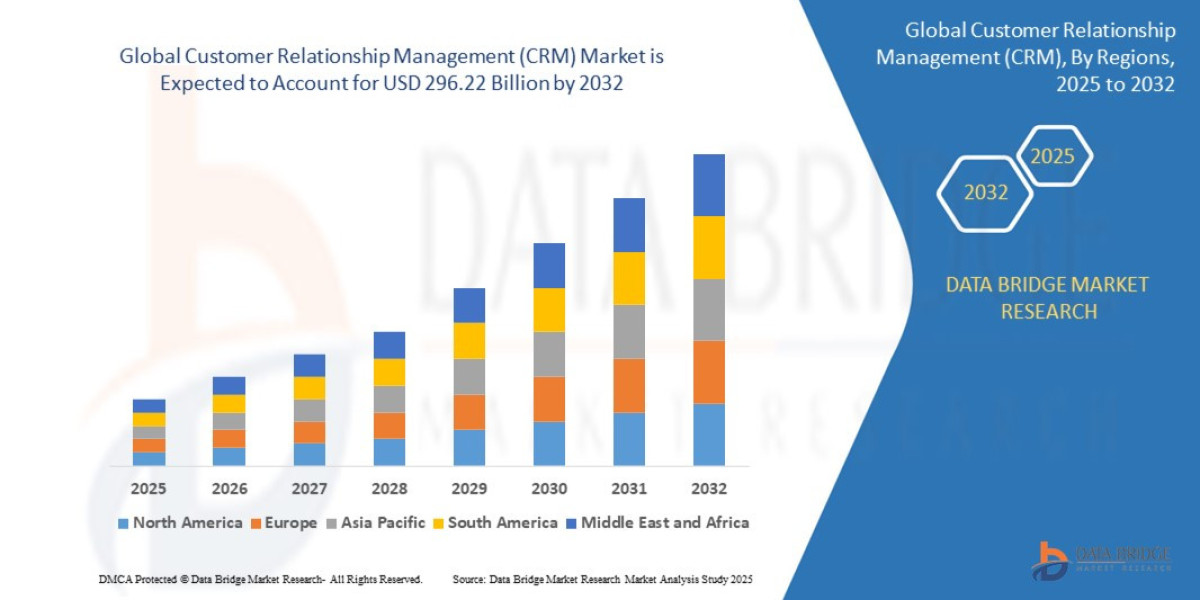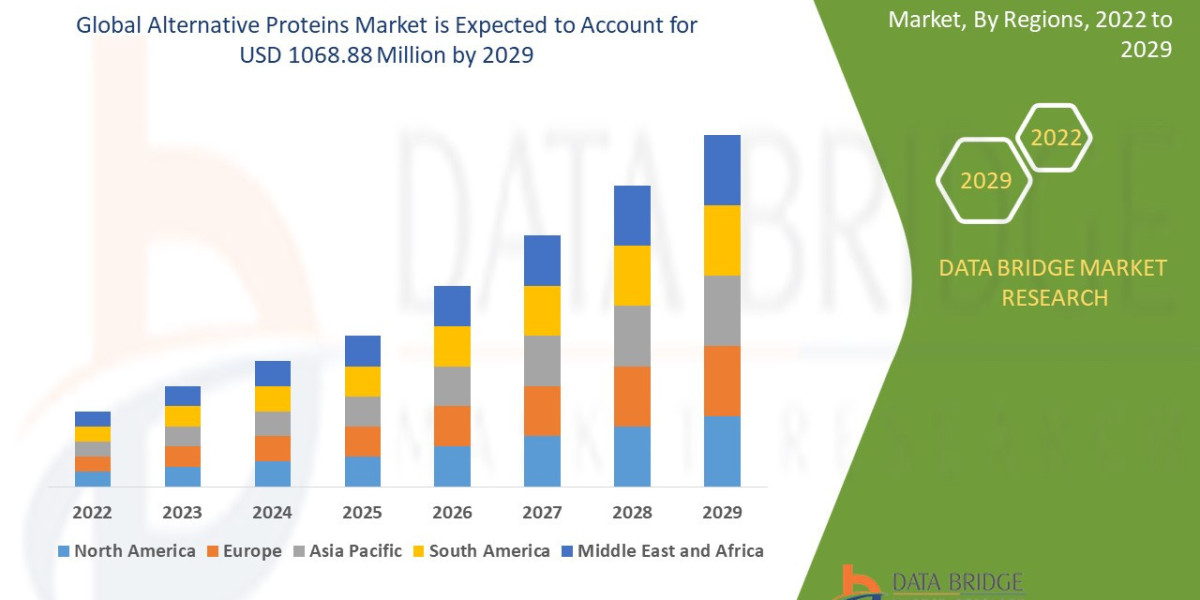- The global customer relationship management (CRM) market was valued at USD 224.95 million in 2024 and is expected to reach USD 296.22 billion by 2032
- During the forecast period of 2025 to 2032 the market is likely to grow at a CAGR of 3.50%, primarily driven by the increasing adoption of AI-powered CRM solutions
With rapid technological advancements and the integration of AI, analytics, and cloud computing, CRM systems are driving a new era of personalized customer experiences and strategic business growth.
Get a full overview of market dynamics, forecasts, and trends. Download the complete Display Market report: https://www.databridgemarketresearch.com/reports/global-customer-relationship-management-crm-market
Introduction
The Customer Relationship Management (CRM) Market has emerged as a cornerstone of modern business strategy. CRM systems enable organizations to manage interactions with customers, streamline processes, and improve profitability by leveraging insights derived from customer data. In today’s digital economy, where customer experience defines brand loyalty, CRM has become indispensable for enterprises of all sizes.
The growing adoption of cloud solutions, automation, and artificial intelligence has revolutionized CRM platforms, allowing businesses to predict customer behavior, automate repetitive tasks, and deliver hyper-personalized experiences. From small startups to global corporations, CRM is now central to enhancing operational efficiency and sustaining customer-centric growth.
This report provides an in-depth analysis of market trends, segmentation, competitive landscape, and future growth prospects within the evolving CRM ecosystem.
Market Definition and Segmentation
The Customer Relationship Management (CRM) Market comprises software and solutions designed to manage and analyze customer interactions throughout the customer lifecycle. The goal is to improve customer retention, enhance satisfaction, and drive sales growth by integrating technology, data analytics, and automation.
Segmentation Overview
By Deployment Model
Cloud-Based CRM: Dominates the market due to scalability, accessibility, and lower maintenance costs.
On-Premises CRM: Preferred by organizations requiring data control and regulatory compliance.
Hybrid CRM: Combines flexibility and control by integrating both cloud and on-premises systems.
By Component
Software: Core CRM applications covering sales, marketing, and service management.
Services: Implementation, integration, consulting, and support services that enhance CRM efficiency.
By Application
Sales Automation
Marketing Automation
Customer Service and Support
Social Media Monitoring
Lead Management and Analytics
By End-User Industry
BFSI (Banking, Financial Services, and Insurance)
IT and Telecom
Healthcare
Retail and E-commerce
Manufacturing
Education
By Geography
North America, Europe, Asia-Pacific, Middle East & Africa, and South America.
Market Dynamics
Drivers
Growing Focus on Customer-Centric Strategies: Businesses are increasingly prioritizing personalized engagement to retain customers and boost satisfaction.
Cloud Adoption: Cloud-based CRM solutions enable flexibility, scalability, and real-time analytics, appealing to small and medium enterprises (SMEs).
Integration of AI and Analytics: Artificial intelligence enhances predictive capabilities, automates data entry, and improves decision-making processes.
Mobile and Social CRM Growth: The rise of mobile devices and social media has expanded CRM’s scope beyond traditional channels.
Restraints
High Implementation and Integration Costs: Initial setup costs and staff training can be barriers for SMEs.
Data Privacy and Security Concerns: Handling sensitive customer data demands strong compliance frameworks.
Complexity in System Integration: Integrating CRM with legacy IT systems poses technical challenges for large enterprises.
Opportunities
AI-Powered Predictive Analytics: Businesses can forecast customer needs and behavior more accurately.
CRM for SMEs: Growing digitalization in small and medium businesses presents a vast untapped market.
Omnichannel CRM Platforms: Integration across channels—email, social media, and chatbots—enhances consistency in customer experience.
Industry-Specific Solutions: Custom CRM tools for sectors such as healthcare, retail, and education are gaining traction.
Challenges
Data Quality and Management Issues: Inconsistent or incomplete data reduces CRM effectiveness.
Rising Competition: The abundance of vendors in the market leads to pricing pressures and product overlaps.
Market Trends and Innovations
The CRM market continues to evolve with innovations focusing on automation, intelligence, and customer engagement.
AI and Machine Learning Integration: AI-driven chatbots, lead scoring, and predictive analytics improve efficiency and personalization.
Customer Data Platforms (CDPs): Unifying customer data across touchpoints for a single, comprehensive view of customer interactions.
Voice and Conversational CRM: Integration of voice assistants like Alexa and Google Assistant into CRM systems for real-time data access.
Social CRM: Social media monitoring and engagement have become integral for brand reputation and customer service.
Automation in Marketing and Sales: Workflow automation streamlines communication, lead management, and campaign execution.
Mobile-First CRM: Mobile CRM apps allow teams to access insights and manage customer data on the go.
Low-Code/No-Code Platforms: Businesses are using customizable CRM tools that require minimal coding, enhancing flexibility and speed of deployment.
Competitive Landscape
The Customer Relationship Management (CRM) Market is highly competitive, with global tech giants and emerging startups continuously innovating to expand market presence.
Key Players
Salesforce Inc.
SAP SE
Oracle Corporation
Microsoft Corporation
HubSpot, Inc.
Zoho Corporation Pvt. Ltd.
Adobe Inc.
SugarCRM Inc.
Freshworks Inc.
Pipedrive OÜ
Key Strategies
Product Innovation: Salesforce and HubSpot are integrating AI-driven insights to enhance automation and predictive analytics.
Mergers and Acquisitions: Companies like Oracle and SAP are expanding portfolios through acquisitions to strengthen CRM offerings.
Strategic Partnerships: Collaborations with analytics and cloud service providers improve solution performance and reach.
Customer-Centric Development: Vendors are emphasizing user-friendly interfaces and mobile integration for better accessibility.
SWOT Analysis (Example – Salesforce Inc.)
Strengths: Market leader with strong brand reputation and broad product portfolio.
Weaknesses: High pricing can limit adoption among SMEs.
Opportunities: Expansion in AI-based CRM and SMB market penetration.
Threats: Intensifying competition and growing data privacy regulations.
Regional Analysis
North America
Dominates the CRM market due to early technological adoption and the presence of leading vendors like Salesforce, Microsoft, and HubSpot. Strong enterprise digitization drives market growth in the U.S. and Canada.
Europe
Significant adoption in BFSI, retail, and healthcare sectors. The region’s emphasis on GDPR compliance is shaping CRM software development focused on data security.
Asia-Pacific
Expected to register the fastest growth, driven by rising digital transformation initiatives in India, China, and Japan. Increasing cloud adoption and SME participation fuel market expansion.
Middle East & Africa
Investments in digital infrastructure and growing e-commerce markets are creating opportunities for CRM providers. GCC countries, in particular, are embracing cloud-based solutions.
South America
Brazil and Mexico are witnessing growing demand due to increasing awareness of CRM’s role in improving customer relationships and sales efficiency.
Market Forecast
The CRM Market is expected to experience sustained growth as organizations continue prioritizing customer engagement and digital transformation.
Forecast Period: 2025–2035
Projected CAGR: Around 10–12% (example projection)
Key Growth Drivers: AI integration, cloud migration, and increasing focus on customer experience management.
Future Outlook:
AI-powered CRM will dominate customer insights and service personalization.
Integration with IoT and blockchain will enhance data security and transparency.
Subscription-based CRM services will drive cost efficiency and scalability for SMEs.
CRM’s evolution from a simple contact management tool to an intelligent decision-making system will redefine business-customer relationships across industries.
Impact of COVID-19
The pandemic accelerated digital transformation, leading to a surge in CRM adoption.
Increased Demand for Remote Collaboration: Businesses leveraged cloud-based CRM systems to maintain customer engagement remotely.
Enhanced Focus on Customer Retention: Companies prioritized existing customers amid market disruptions.
Adoption of Automation and AI: CRM solutions incorporated automation to handle increased digital customer interactions efficiently.
Post-Pandemic Recovery: Organizations continue investing in CRM to future-proof customer relationship strategies and maintain agility.
Conclusion
The Customer Relationship Management (CRM) Market is redefining how companies interact with customers, making data-driven decision-making a strategic imperative. CRM systems not only streamline processes but also build the foundation for customer loyalty, brand advocacy, and sustained profitability.
As artificial intelligence, automation, and omnichannel communication converge, CRM will remain central to every organization’s digital strategy. For stakeholders and investors, this sector presents immense growth opportunities backed by continuous innovation and increasing enterprise adoption worldwide.
Frequently Asked Questions (FAQ)
1. What is driving the growth of the CRM market?
The surge in digital transformation, cloud adoption, and AI integration are major growth factors fueling the CRM market.
2. Which industries use CRM solutions the most?
Industries such as BFSI, retail, healthcare, IT & telecom, and manufacturing are leading users of CRM systems.
3. How is AI influencing CRM software?
AI enhances predictive analytics, automates repetitive tasks, and helps businesses deliver personalized customer experiences.
4. What are the key challenges in CRM implementation?
Data security, high setup costs, and integration with existing systems are primary challenges for many organizations.
5. Which region dominates the CRM market?
North America holds the largest market share, driven by high enterprise digitization and the presence of leading CRM providers.
6. How did COVID-19 impact CRM adoption?
The pandemic accelerated CRM adoption as businesses required remote management tools and digital engagement capabilities.
About Data Bridge Market Research:
An absolute way to forecast what the future holds is to comprehend the trend today!
Data Bridge Market Research set forth itself as an unconventional and neoteric market research and consulting firm with an unparalleled level of resilience and integrated approaches. We are determined to unearth the best market opportunities and foster efficient information for your business to thrive in the market. Data Bridge endeavors to provide appropriate solutions to complex business challenges and initiates an effortless decision-making process. Data Bridge is an aftermath of sheer wisdom and experience which was formulated and framed in the year 2015 in Pune.
Browse More Reports:
Global Flare Monitoring Market
Global Flexible Electronic Paper Market
Global Flexible Substrates Market
Global Flight Data Monitoring Market
Global Floriculture Lighting Market
Global Flow Wrap Machines Market
Global Fluidized Catalytic Cracking (FCC) Catalyst Market
Global Fly Ash Distribution Market
Global Food Antioxidants Market
Global Food Carrageenan Market
Global Food Grade Triacetin Market
Global Food Starter Culture Market
Global Form-Fill-Seal Machines Market
Global Fortified Water Market
Global Freeze Drying Market
Contact Us:
Data Bridge Market Research
US: +1 614 591 3140
UK: +44 845 154 9652
APAC: +65 3125 1975
Email: corporatesales@databridgemarketresearch.com








